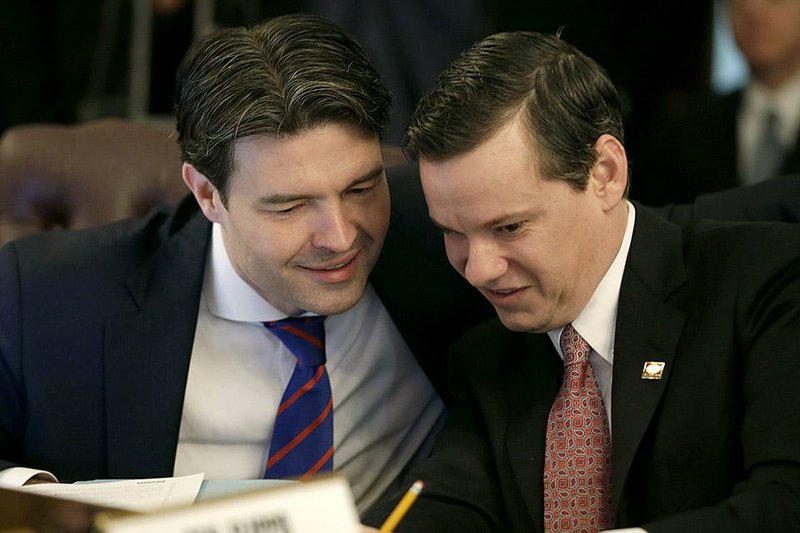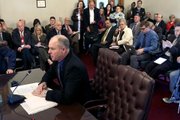Arkansas Gov. Asa Hutchinson's plan to continue the state's private-option Medicaid expansion program through the end of 2016 cleared two hurdles Wednesday, and lawmakers blocked a separate attempt to end the program at the end of this year.
RELATED ARTICLES
http://www.arkansas…">Bills on ethics, liquor stores clear House committeehttp://www.arkansas…">Bid to split Lee, King Day failshttp://www.arkansas…">Budget falls short for state children, advocate asserts http://www.arkansas…">Legislative summaryhttp://www.arkansas…">Calendar
The Senate Public Health, Welfare and Labor Committee voted 6-1 to recommend passage of Senate Bill 96 that would create a task force to study alternatives to the private option and changes to the state's entire Medicaid system.
The Legislature's Joint Budget Committee also recommended Wednesday approval of legislation authorizing the use of federal money to continue funding the private option in the fiscal year starting July 1.
The committees' actions came six days after Hutchinson called on the Legislature to continue funding the private option through next year. He had also requested the task force.
In a voice vote without debate, the Joint Budget Committee approved SB101, which is an appropriation for the Division of Medical Services in fiscal 2016. It includes funding for the private option.
"I think most people support the governor and his plan to run it through Dec. 31, 2016," Joint Budget Committee Co-chairman Sen. Larry Teague, D-Nashville, told reporters when asked why it had passed without debate.
Committee Co-chairman Rep. Lane Jean, R-Magnolia, predicted that the Legislature will reauthorize private option funding.
"I think the idea of the governor trying to wind it down in the future has eased a lot of the heartburn for the members, so that's probably why you didn't see a battle here," Jean said. "I anticipate it passing."
The total fiscal 2016 appropriation for the private option in SB101 is $1.99 billion, but Department of Human Services spokesman Amy Webb said the anticipated program costs for fiscal 2016 are a little less than $1.63 billion.
Senate President Pro Tempore Jonathan Dismang, R-Searcy, said he expects the Senate will approve both SB101 and SB96 this morning.
Hutchinson said he was happy with the committee vote for his plan presented, by Senate Republican leader Jim Hendren, R-Sulphur Springs, in the Senate Public Health Committee on Wednesday. Hendren is Hutchinson's nephew.
"I am especially pleased with this strong indication of support for the new chapter in health care reform that I outlined in my speech last week at UAMS," Hutchinson said in a statement issued Wednesday. "There is increasing momentum as we seek to reform Medicaid in a way that works best for our state and is affordable. It is gratifying to see us come together on this for the people of Arkansas. We are on the right path."
Hendren spent about 15 minutes explaining SB96 and the goals of the 16-member task force before answering committee questions Wednesday.
He said the legislation, which keeps the current private-option program structure in place as long as the federal government pays 100 percent of the cost, is a way to reach a balance between lawmakers who wanted to continue the program with some changes and lawmakers who wanted to end it immediately.
"What this legislation does in general terms is, I think, remove us from a crisis of an abrupt change. It removes us from a crisis legislatively of coming to a situation that none of us want to get to, where we get in a stalemate," Hendren said. "It was brought to us [that] we have some cost issues in the current Medicaid program that need to be addressed. This puts in place a process that can do that in a very deliberate and direct way. It also puts in place some pretty serious deadlines that force the task force to come up with some solutions because the alternative may be very painful."
Authorized under the federal 2010 Patient Protection and Affordable Care Act and approved by the Legislature in 2013, the expansion of the state's Medicaid program extended eligibility to adults with incomes of up to 138 percent of the poverty level: $16,105 for an individual, for instance, or $32,913 for a family of four.
More than 223,000 newly eligible adults had been approved for coverage as of Nov. 30. Of those, more than 188,000 were enrolled in private, Medicaid-funded plans on the exchange; more than 25,000 were assigned to the traditional Medicaid program because they were considered to have exceptional health needs; and more than 10,000 had not yet completed enrollment.
If the private option continued as approved, the federal government would require Arkansas to pay 5 percent of the costs in 2017 with that share gradually rising to 10 percent of the costs starting in 2020.
Sen. Gary Stubblefield, R-Branch, was the lone vote against Hendren's SB96.
Several other senators, who voted against funding the private option during the 2014 fiscal session, have said they plan to support the task force bill and the appropriation when they come before the full Senate today, including Sen. Cecile Bledsoe, R-Rogers, the chairman of the Senate Public Health Committee.
But Bledsoe was also one of three senators who voted in favor of SB144, sponsored by Sen. Linda Collins-Smith, R-Pocahontas, when it came before the committee Wednesday.
The bill, which seeks to end the private option program at the end of this year, failed to make it out of committee with a 3-3 tie vote; two senators abstained.
In addition to Bledsoe, Stubblefield and Sen. Scott Flippo, R-Bull Shoals, voted for SB144.
Bledsoe said she voted for Collins-Smith's bill because, "that's my first choice." But she said she views the task force bill and the bill authorizing funding for the private option for next fiscal year as a way to end the program at the end of 2016.
Teague, who has voted to fund the private option in the past, said he believes that there are at least the required 27 votes in the 34-member Senate to approve SB101.
Jean, who has voted against funding the private option in the past, said that he's opposed the private option because "we are subsidizing insurance companies' profits with public dollars [and] I think that is wrong.
"I think we could deliver a system to the needy in a much better way. Supposedly we are going to have another program down the road. But I still don't like the profits we are giving insurance companies with public dollars. It's not the most efficient way to do it."
Jean said he'll have trouble voting for SB101 in the House.
"I would think that they would have the votes [in the House to approve SB101]. There is still going be a good segment of what we had last time [who oppose funding for the private option] as a principle," he said.
Even if the Legislature approves SB101, the Legislature would have to pass another bill in next year's fiscal session in order to authorize the use of federal funds to finance the private option from July 1, 2016, through Dec. 31, 2016.
A section on 01/29/2015



